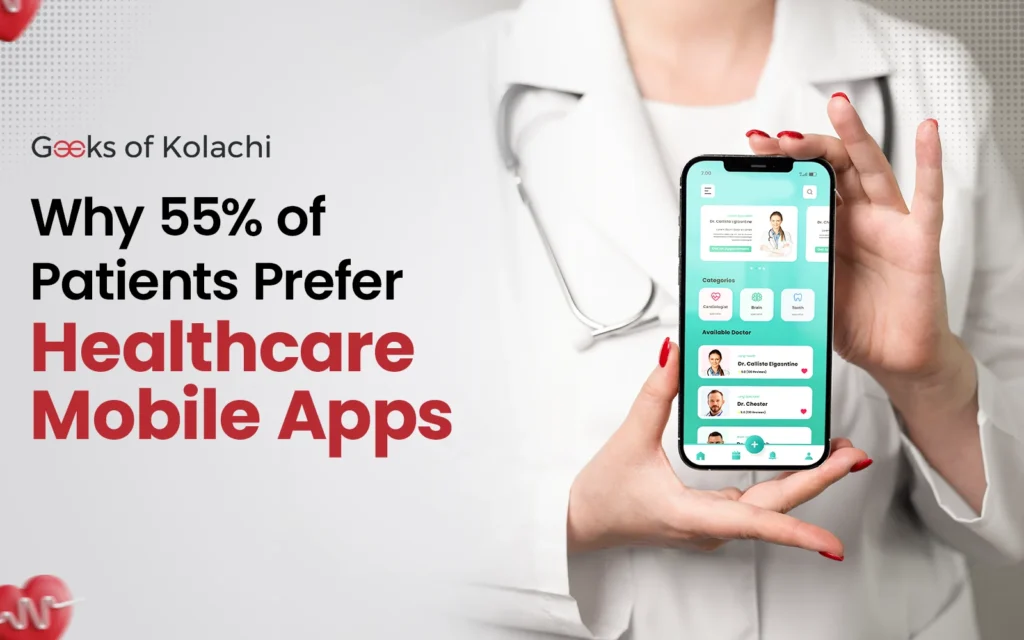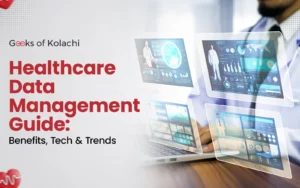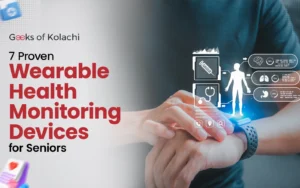
Why 55% of Patients Prefer Using Healthcare Mobile Apps: Benefits, Trends, and Development Insights
In today’s fast-paced digital world, healthcare is no longer confined to clinics and hospitals. More than 55% of patients prefer using healthcare mobile apps to manage their health and access medical services conveniently. This shift marks a profound transformation in how patients engage with healthcare providers, track their well-being, and take control of their health journeys.
In this blog, we’ll explore the reasons behind this growing preference, the benefits these apps provide, the technology driving their development, and why partnering with a top-notch healthcare mobile app development company is essential for creating solutions that truly matter.
Understanding Healthcare Mobile Apps
A healthcare mobile app is a software application designed specifically to improve healthcare delivery and patient engagement via mobile devices. These apps come in many forms — from simple medical apps that remind users to take medication, to sophisticated healthcare applications offering virtual doctor visits, chronic condition monitoring, or fitness tracking.
The rise of mobile apps and healthcare integration reflects a broader trend toward digital health solutions that provide instant access to medical information, diagnostics, and care management. Patients are no longer passive recipients of care but active participants, empowered by technology to make informed health decisions anytime, anywhere.
Key Reasons Patients Prefer Healthcare Mobile Apps
So, why do more than half of patients favor mobile apps over traditional healthcare methods? Here’s a look at the main factors:
-
Convenience and Accessibility
Healthcare mobile apps for patients bring health management to the palm of your hand. No more waiting rooms or strict office hours — users can access services 24/7. This convenience is especially valuable for busy professionals and those living in remote areas. In fact, according to a recent report on mobile device usage, the vast majority of people rely on their smartphones daily, making these apps a perfect fit for modern lifestyles.
-
Remote Consultations and Telemedicine
Virtual visits through healthcare mobile apps for patients eliminate the need for in-person appointments. Whether it’s a quick consultation for a minor illness or ongoing mental health support, mobile apps connect patients with healthcare professionals seamlessly. Platforms like Doctor On Demand have made this approach widely accessible, offering real-time video consultations with licensed physicians and therapists.
-
Personalized Health Tracking
Many health apps offer tools to monitor vital signs, track symptoms, and manage chronic diseases. This personalized approach helps users stay proactive about their health, often with real-time insights tailored to their unique needs.
-
Improved Communication
Secure messaging and video calls via healthcare apps enhance patient-provider communication. Quick updates, medication adjustments, and follow-ups are easier and more efficient.
-
Privacy and Security
Leading healthcare mobile app developers prioritize compliance with regulations like HIPAA, ensuring patient data is protected. For those curious about the details behind these regulations, the basics of HIPAA and its role in safeguarding health information provide valuable context. Additionally, users concerned about protecting their health data on mobile devices can learn more about mobile device privacy and security in healthcare to build confidence in these technologies.
Whether you’re aiming to enhance your current offerings or launch a new app, integrating your project with comprehensive healthcare software solutions can help deliver seamless patient experiences and robust functionality.
|
Ready to bring your healthcare app idea to life? |
Popular Healthcare Mobile Apps for Patients
Several standout apps for healthcare have become household names in the US healthcare ecosystem. These platforms demonstrate the power of healthcare applications in making health management intuitive and accessible:
- Doctor On Demand offers real-time video consultations with licensed physicians and therapists.
- Teladoc is an affordable on-demand care app providing 24/7 access to doctors and mental health professionals.
- Medisafe excels in medication management with reminders and drug interaction warnings.
- Maven focuses on women’s health, providing reproductive, prenatal, and mental health support.
- ZocDoc simplifies appointment scheduling by showing real-time availability of providers nearby.
- Fitbit tracks physical activity, sleep, and nutrition, encouraging healthier lifestyles.
These apps illustrate the wide range of mobile healthcare applications available, each addressing specific patient needs and preferences.
Technology Driving Healthcare Mobile App Development
Behind every successful healthcare mobile app is advanced technology crafted by expert developers. The latest innovations shaping this space include:
- Artificial Intelligence (AI) and machine learning power predictive analytics, enabling apps to provide personalized health insights and early detection of medical conditions.
- Blockchain technology enhances data security and transparency, crucial for protecting sensitive health records.
- User-centered design ensures apps are intuitive and accessible, catering to diverse patient demographics.
- Seamless interoperability allows apps to integrate with electronic health records (EHRs), wearables, and other health platforms.
Such technological advancements make healthcare mobile app development services more effective in delivering patient-centric solutions that improve outcomes.
Engaging with a company that specializes in customized bespoke software development services ensures your app is tailored to the exact needs of your users and healthcare providers, delivering maximum value and impact.
How a Healthcare Mobile App Development Company Creates Patient-Centric Apps
Choosing the right healthcare mobile app development companies is critical for turning healthcare ideas into impactful mobile solutions. Here’s what they focus on:
- Building a healthcare mobile application that are simple, secure, and reliable with smooth navigation and clear features.
- Ensuring HIPAA and GDPR compliance to protect patient data and build trust.
- Creating apps compatible across multiple devices and operating systems, providing broad accessibility.
- Offering ongoing support and updates to keep apps current with changing healthcare needs and technologies.
The best mobile app development companies for healthcare work closely with healthcare providers to customize apps that reflect patient needs, regulatory requirements, and emerging trends.
To deepen the effectiveness of your healthcare app, leveraging clinical analytics for better patient outcomes is key to making informed decisions and enhancing care delivery.
Benefits for Healthcare Providers and the Industry
A mobile medical app is not only a boon for patients; it offers immense advantages for healthcare providers and the entire industry:
- Streamlining administrative tasks like appointment bookings, billing, and prescription refills saves time and resources.
- Enhancing patient outcomes through better engagement and monitoring of chronic conditions.
- Reducing healthcare costs by minimizing unnecessary in-person visits and hospital readmissions.
- Improving access to care for underserved populations in rural and remote locations.
The shift toward mobile apps and healthcare is paving the way for more efficient, affordable, and patient-focused medical services.
Future Trends in Mobile Apps for Healthcare
The future of mobile apps in healthcare industry looks bright and full of innovation. Here are some trends to watch:
- Greater integration of wearable devices for continuous health monitoring.
- Expansion of AI-powered diagnostic tools providing real-time decision support.
- Growth of free medical apps offering essential health services to wider populations.
- Increased emphasis on mental health and wellness apps.
- Deeper integration with healthcare systems via APIs for comprehensive health management.
As technology evolves, best health apps will focus on creating smarter, more adaptive apps that deliver personalized care.
Conclusion
The fact that medical apps for patients underscores a fundamental shift in how healthcare is delivered and consumed. These apps provide unparalleled convenience, personalized care, and enhanced communication, reshaping patient experiences across the country.
From remote consultations to medication management, mobile healthcare applications empower patients to take charge of their health with just a few taps. The continuous advancements in technology and thoughtful development by expert companies are making these free medical apps indispensable tools in modern healthcare.
If you’re looking to innovate in the healthcare space, partnering with Geeks of Kolachi ensures your project benefits from experts and your healthcare app is tailored to your unique needs. Connect with our skilled healthcare mobile app developers today and bring your vision to life with solutions designed for impact and growth.
| Want to create a healthcare app that truly makes a difference? Partner with our experienced developers to build secure, easy-to-use apps tailored to your needs. Contact us now and start turning your vision into reality! |
Frequently Asked Questions
-
What is a healthcare mobile app?
A healthcare mobile app is a smartphone application that helps users manage health tasks like booking appointments, tracking symptoms, and consulting doctors remotely. -
How do healthcare mobile apps benefit patients?
They provide 24/7 access to care, personalized health tracking, remote consultations, and improve communication with healthcare providers. -
Are healthcare mobile apps secure and private?
Yes. They comply with regulations like HIPAA and use encryption to protect patient data. -
What features should a healthcare mobile app have?
Key features include medication reminders, appointment scheduling, health tracking, real-time provider communication, and strong data security. -
How do healthcare mobile apps protect my data?
By using encryption, secure login methods, and following healthcare privacy laws such as HIPAA and GDPR. -
Are healthcare mobile apps easy to use?
Yes, they are designed with user-friendly interfaces for easy navigation across multiple devices. -
How much do healthcare mobile apps cost?
Costs vary; some apps are free, while others offer premium features or subscription plans. -
Are healthcare mobile apps covered by insurance?
Coverage depends on your insurance provider and the app. Some telehealth services are covered, but check with your insurer. -
How can healthcare providers benefit from mobile apps?
They streamline tasks, enhance patient care, reduce costs, and improve access to healthcare services.





















